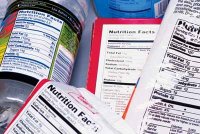 “Fresh fruit is a healthy, high-fiber breakfast food. See more pictures of fruit.©iStockphoto.com/perkmeup
“Fresh fruit is a healthy, high-fiber breakfast food. See more pictures of fruit.©iStockphoto.com/perkmeup
Your usual breakfast may consist of a few cups of coffee or maybe nothing at all. It makes sense to skip a meal if you’re trying to watch your calories, right? But you may be surprised to learn that skipping breakfast is actually the wrong approach for losing weight. A research group found that people who regularly eat breakfast generally have a lower fat intake and are more likely to exercise than their breakfast-skipping counterparts [source: Davis]. Eating breakfast helps reduce your hunger level throughout the day, which enables you to make better food choices. Just like you shouldn’t go to the grocery store hungry, you shouldn’t start your day hungry either.
Rise and Shine
The moment you wake up, your body is in survival mode after a night without food. Your adrenaline is pumping and your cortisol levels, which control metabolism and blood sugar, are high. Your brain begins its hunt for energy in the form of food. If you skip breakfast, you’re not providing your hungry brain the fuel it needs, so it starts going after the energy stored in your muscles. Your blood sugar drops and your metabolism slows, which means you’re burning fewer calories and probably feeling a little sluggish. When you finally eat, your body stores the food as fat because it thinks it’s starving. Serotonin levels are also high in the morning, which reduces food cravings and could explain why you’re not particularly hungry for breakfast. But they drop throughout the day, leaving you a hapless victim to your cravings for decadent foods like chocolate and sweets.
Food for Thought
Lots of fiber and fewer calories are the name of the game when it comes to planning your ideal breakfast. Fruits, vegetables and whole grains are all high-fiber foods that fit the bill. Fiber has countless health benefits — it prevents constipation, lowers cholesterol, keeps blood sugar levels in check and helps you feel full. Fresh fruit is a great addition to any breakfast, so consider keeping fresh or frozen fruit on hand year-round. Frozen fruit has a lot of nutritional value because it’s picked when it’s ripe and immediately frozen. Cereal with fresh fruit and skim milk is a no-brainer when it comes to a quick breakfast that’s full of fiber and low in calories, but it’s best to steer clear of the sugary cereals to avoid empty calories. Bagels are a good source of whole grains, but they also pack the calories, and toppings like butter and cream cheese add a lot of fat. If you need a carb fix, it’s best to opt for a piece of toast with a low-fat spread.
Ideal Meals
An egg-white omelet with a medley of vegetables is a great way to start your day, as is a bowl of oatmeal with fresh fruit and skim milk. But a lot of people skip breakfast simply because they don’t have enough time in their mornings to prepare a meal. If this sounds like you, have no fear — there are many grab-and-go foods you can keep on hand to get your day started right. A banana with peanut butter gives you a protein boost that will get your blood pumping, or you can toss some berries, ice and yogurt into the blender for a delicious smoothie you can take on the road. It’s also good to keep some nonfat yogurt cups in the fridge — one of these can make a great portable breakfast when eaten with a banana or blueberries.
For more information on the benefits of a healthy breakfast, see the links on the next page.
Did You Know?
The word breakfast is a literal expression. While you’re sleeping, your body is technically fasting, and when you eat your first meal in the morning, you break the fast [source: Liberman].
Lots More Information
Related HowStuffWorks Articles
- 10 Foods You Should Buy Organic
- 5 Healthy Foods That are Fun to Make
- 5 Cupcakes That Won’t Put on the Pounds
- How to Get More Fruit in Your Diet
- How Nutrition Works
- How Vegetarians Work
Sources
- "Can Eating a Big Breakfast Help You Lose Weight?" Cnn.com, December 10, 2008. http://www.cnn.com/2008/HEALTH/dailydose/11/19/big.breakfast/index.html
- Davis, Jeanie Lerche. "Lose Weight: Eat Breakfast." Webmd.com, 2005. http://www.webmd.com/diet/features/lose-weight-eat-breakfast
- "Dietary fiber: An essential part of a healthy diet." Mayoclinic.com, 2009.http://www.mayoclinic.com/health/fiber/NU00033
- "Don’t Skip Breakfast to Cut Calories." American Council on Exercise, 2009. http://www.acefitness.org/fitfacts/fitfacts_display.aspx?itemid=2671
- Leong, Kristie. "How to Increase Your Metabolism by Eating a Healthy Breakfast." Associatedcontent.com, October 31, 2007. http://www.associatedcontent.com/article/428199/how_to_increase_your_metabolism_by.html?cat=51
- Liberman, Anatoly. "Word Origins and How We Know Them." Oxford University Press, 2005. pp.75-76.














































